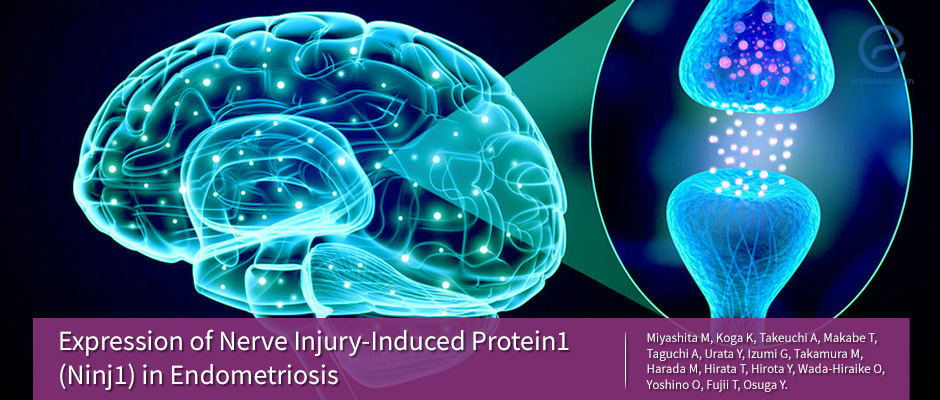A novel neurotransmitter, Ninj1, has been found to be expressed in endometriosis
Nov 19, 2018
Ninj1 may be involved in the pathogenesis of endometriosis and its pain symptoms.
Key Points
Highlights:
- Ninj1 is expressed in endometriosis and adenomyosis and induced by the inflammatory milieu characteristic of endometriosis.
Objectives:
- To confirm whether or not Ninj1 protein is expressed in endometriosis and adenomyosis, to evaluate the association between the location of the Ninj1 positivity with the presence of nerve fibers in ovarian endometrioma, and to clarify whether or not the inflammatory stimuli enhances the Ninj1 expression in human endometriotic stromal cells (ESCs)
What's done here:
- Patients diagnosed with ovarian endometrioma (n=15), peritoneal endometriosis (n=5), adenomyosis (n=5), and other gynecological disorders (n=5, control) were included in the study.
- Immunostaining with anti-Ninj1 antibody was performed in order to detect Ninj1 protein expression in the endometriosis, adenomyosis, and eutopic endometrium.
- Nerve fibers in the ovarian endometrioma were detected by positive staining of PGP-9.5.
- To evaluate the effects of IL-1b on Ninj1 gene expression in endometriosis, ESCs isolated from ovarian endometrioma (n=15) were treated with IL-1b (5 ng/mL) for 3 or 6 hours; (mRNA) expression for Ninj1 was examined using quantitative RT-PCR.
Key results:
- Ninj1 protein was expressed by ovarian endometrioma, peritoneal endometriosis, and adenomyosis. The presence may be may be related with the pathogenesis of endometriosis.
- Nerve fibers were found in the areas of positive staining for Ninj1 in ovarian endometrioma. Ninj1 could induce nerve growth and thereby may contribute to the pathogenesis of pain symptoms of endometriosis.
- IL-1b, an indicator of inflammation in endometriosis, significantly increased Ninj1 mRNA expression by ESC.
Limitations:
- More quantitative and detailed studies are required in order to compare the expression of Ninj1 with other diseases or normal tissues and to explore the full effects of Ninj1 and fully appreciate its actions in endometriosis.
Lay Summary
Chronic inflammation is involved in the pathogenesis of endometriosis and adenomyosis, and inflammatory cytokines such as IL-1b are highly expressed in them. Inflammation and subsequent hyperinnervation are involved in the pathophysiology of pain generation. High levels of expression of various neurotransmitters are also present in these tissues.
Nerve injury-induced protein 1 (Ninjurin, Ninj1), an adhesion molecule originally identified in dorsal root ganglion neurons and Schwann cells after nerve injury. It mediates hemophilic adhesion and promotes neurite outgrowth. The Ninj1 is also expressed by many other cell types and is induced under inflammatory conditions and controls neural generation. Thus far, the expression of Ninj1 in female reproductive organs as well as in endometriosis and adenomyosis has not been investigated.
Miyashita et al. have recently studied the expression of Ninj1 in endometriosis and adenomyosis lesions, and its inductive factor in human endometriotic stromal cells (ESCs) and has published it in the journal Reproductive Sciences.
The current study demonstrated a novel neurotransmitter, Ninj1, that may be involved in the pathogenesis of endometriosis since it was found to be expressed by ovarian endometrioma, peritoneal endometriotic, and adenomyotic lesions.
The finding of the presence of nerve fibers in the areas of positive staining for Ninj1 in ovarian endometrioma shows that Ninj1 promotes an increase in neurite outgrowth. This suggests that Ninj1 plays a role in their innervation and is thereby involved in the pathogenesis of pain symptoms inherent to endometriosis and adenomyosis.
IL-1b, a major pro-inflammatory cytokine enhanced in endometriosis is indicated to significantly increase Ninj1 expression by ESCs. The role of Ninj1 in neurite outgrowth could stimulate nerve growth and thereby pain symptom of endometriosis.
Ninj1 has been shown to promote also angiogenesis, modulate p53-dependent cell survival and senescence, mediate leukocyte migration and in turn mediate inflammation. Ninj1 may affect not only pain symptoms but also the progress of endometriosis per se.
Research Source: https://www.ncbi.nlm.nih.gov/pubmed/30326781
Ninjurin-1 Ninj1 nerve fiber endometriosis adenomyosis inflammation

